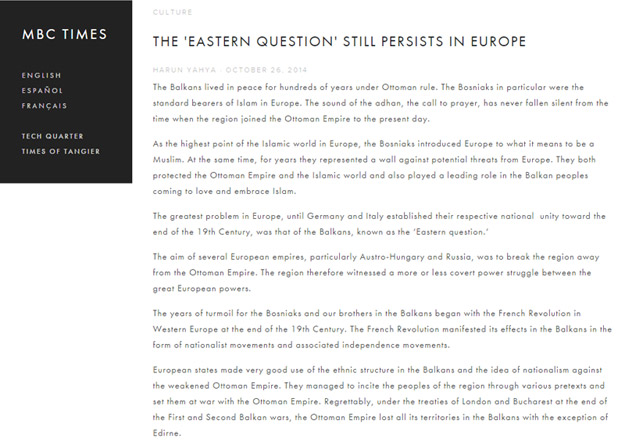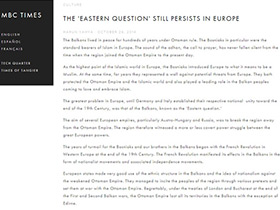
The Balkans lived in peace for hundreds of years under Ottoman rule. The Bosniaks in particular were the standard bearers of Islam in Europe. The sound of the adhan, the call to prayer, has never fallen silent from the time when the region joined the Ottoman Empire to the present day.
As the highest point of the Islamic world in Europe, the Bosniaks introduced Europe to what it means to be a Muslim. At the same time, for years they represented a wall against potential threats from Europe. They both protected the Ottoman Empire and the Islamic world and also played a leading role in the Balkan peoples coming to love and embrace Islam.
The greatest problem in Europe, until Germany and Italy established their respective national unity toward the end of the 19th Century, was that of the Balkans, known as the ‘Eastern question.’
The aim of several European empires, particularly Austro-Hungary and Russia, was to break the region away from the Ottoman Empire. The region therefore witnessed a more or less covert power struggle between the great European powers.
The years of turmoil for the Bosniaks and our brothers in the Balkans began with the French Revolution in Western Europe at the end of the 19th Century. The French Revolution manifested its effects in the Balkans in the form of nationalist movements and associated independence movements.
European states made very good use of the ethnic structure in the Balkans and the idea of nationalism against the weakened Ottoman Empire. They managed to incite the peoples of the region through various pretexts and set them at war with the Ottoman Empire. Regrettably, under the treaties of London and Bucharest at the end of the First and Second Balkan wars, the Ottoman Empire lost all its territories in the Balkans with the exception of Edirne.
As Europe embarked on a fight for colonialism within itself, the Austro-Hungarian Empire annexed Bosnia-Herzegovina in 1908. That process of annexation is known as the ‘Bosnian Crisis of 1908.’
Since Serbia thought that its own territory was next in line for a move from the Austro-Hungarian Empire, it protested that annexation. Serbia’s main ally, Russia, was facing its own difficulties at that time and was able to offer Serbia no more than verbal support. Serbia was unable to demonstrate any serious reaction against the annexation of Bosnia, and remained on the defensive.
The most important thing for Russia was Istanbul and the Dardanelles Straits; it even reached a verbal agreement with Austro-Hungary on the subject. Under that agreement, in return for Russia having use of the Straits, it would not protest the annexation of Bosnia. Russia expected the first counter-move against the Austro-Hungarian move on to Bosnia to come from Great Britain and France. However, no such reaction was forthcoming from those countries.
Since the Ottoman Empire lacked the strength to fight the Austro-Hungarian Empire it was forced to abandon the region to Austro-Hungary in return for 2.5 million pieces of gold. Reluctantly, the Ottoman Empire had to withdraw from lands it had ruled for 400 years.
At the beginning of the 20th Century, however, the political situation in Europe was one of turmoil. Germany and Italy had established their respective national unity comparatively later than the other European powers and lagged far behind countries such as Great Britain, France, Holland, Spain and Russia in the race for colonization. A terrible war in Europe was inevitable when these two countries turned to military force in the fight for colonies.
It was the Balkan people who suffered the greatest losses in the First and Second World wars and the Balkan wars before them.
After the Second World War, the Balkan peoples, who had risen up against the Ottoman Empire due to European false promises of independence, this time came under the rule of communist Yugoslavia and were exposed to assimilation for many years.
There is little difference between the power struggles in the early 20th Century in the Balkans and what is happening now: The powers, components and causes are all the same and it is the same oppressed people who end up the losers.
The Austro-Hungarian Empire wanted Bosnia in the early 20th Century and acted accordingly. Today, the European Union wants the entire Balkans. The young population in the Balkans is particularly attractive for Europe, with its rapidly aging population.
For years, enormous efforts were made to assimilate the people of the Balkans under the communist Yugoslavian regime yet they fought hard to preserve their unique identities and existence. Now they are having to strive against the EU in order to preserve their own cultures.
Although Western countries are providing important financial support for the countries in the region, Europe is trying to attract the young people of the region with the strategy of “No Kosovans, Bosniaks, Albanians, Macedonians or Serbs; only Europeans” it is trying to impose and this is having quite an effect in the region.
The most important example is the lack of reaction on the part of young people to the burning of the National Library in Bosnia. Yet hundreds of Bosnians were martyred in the war between 1991 and 1995 in order to protect the archives that were burned in the library.
Activities concentrating on national and moral values are urgently needed, not just in Bosnia but in the Balkans as a whole, against this subtle strategy of assimilation on the part of the West. It will not be easy; the peoples must unite and act as one.
In the same way that the Western powers tore these societies away from the Ottoman Empire through various intrigues in the early 20th Century, they may now tear them away from their past.
Our Bosniak brothers must be united against this threat of assimilation and degeneration. In establishing peace and unity in their countries they must also strive for a Balkan Union to take its place inside the Islamic Union.
The people of the Balkans long for the climate of peace that prevailed for hundreds of years in the Ottoman Empire. Insha’Allah, that climate of peace can be rebuilt in the Balkans with the establishment of an Islamic Union.
Adnan Oktar's piece on MBC Times:
http://www.mbctimes.com/english/the-eastern-question-still-persists-in-europe


